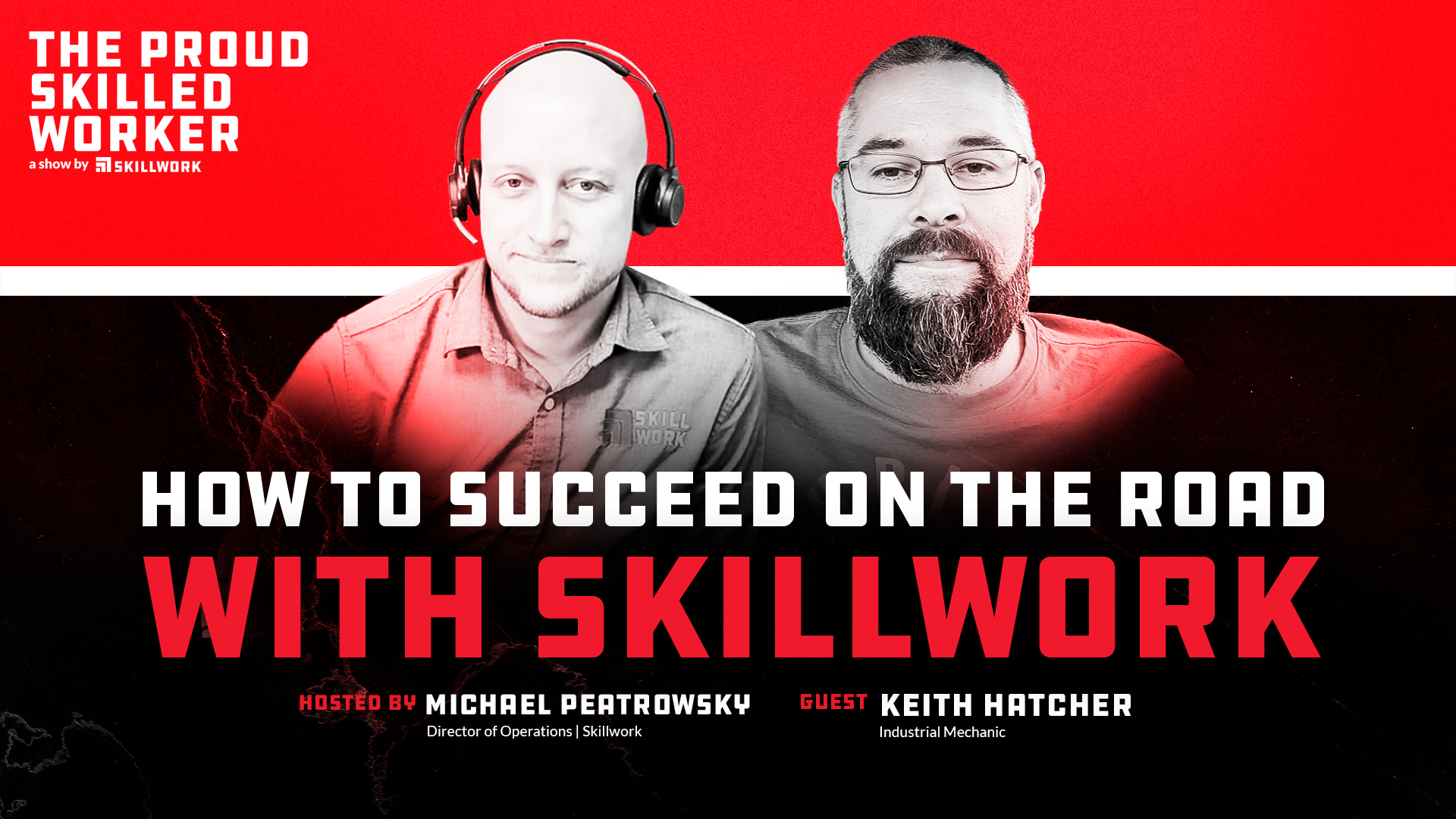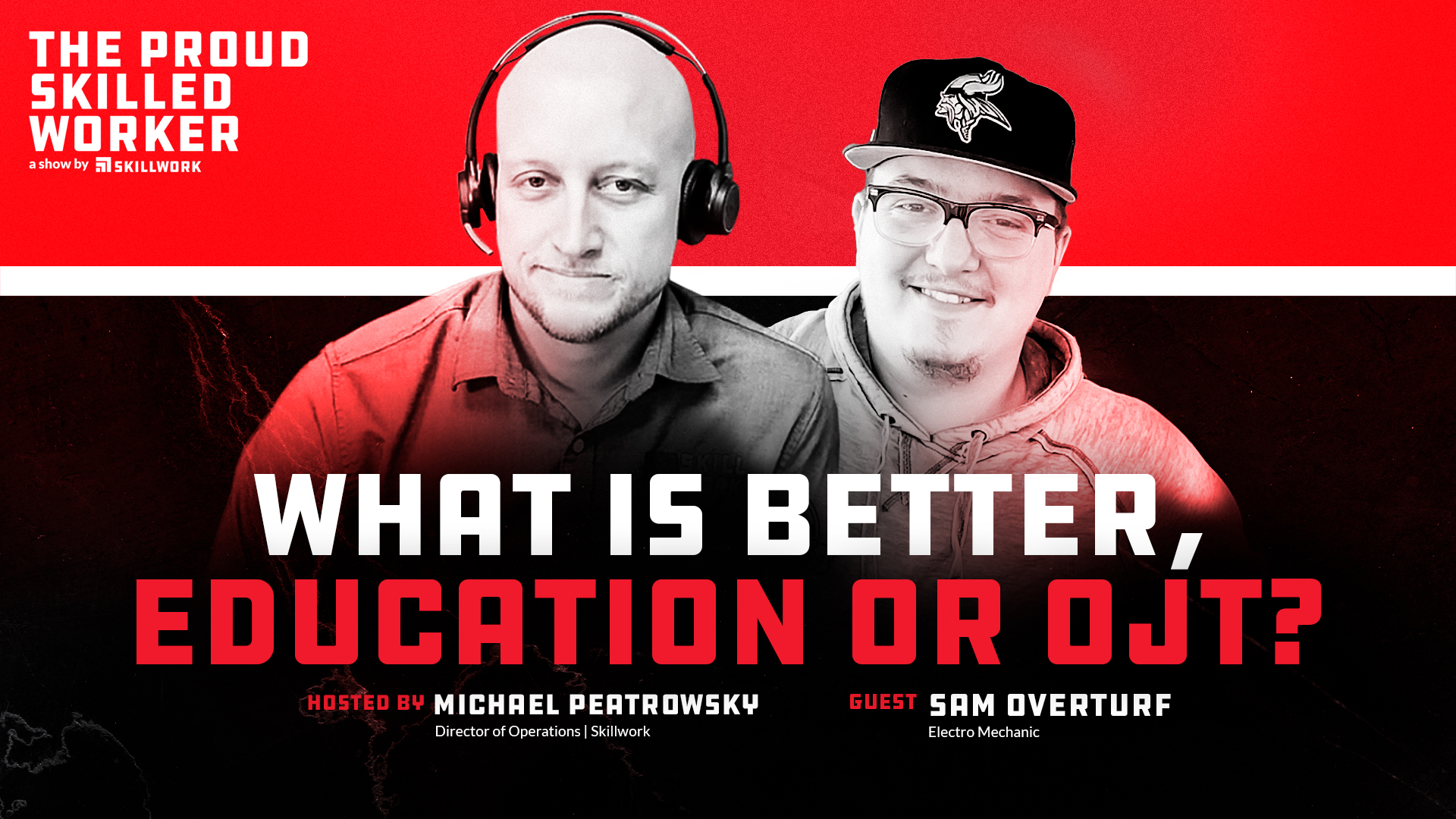How to Advance Your Education as a Tradesman Without Sacrificing Your Pay - with Justin Stewart
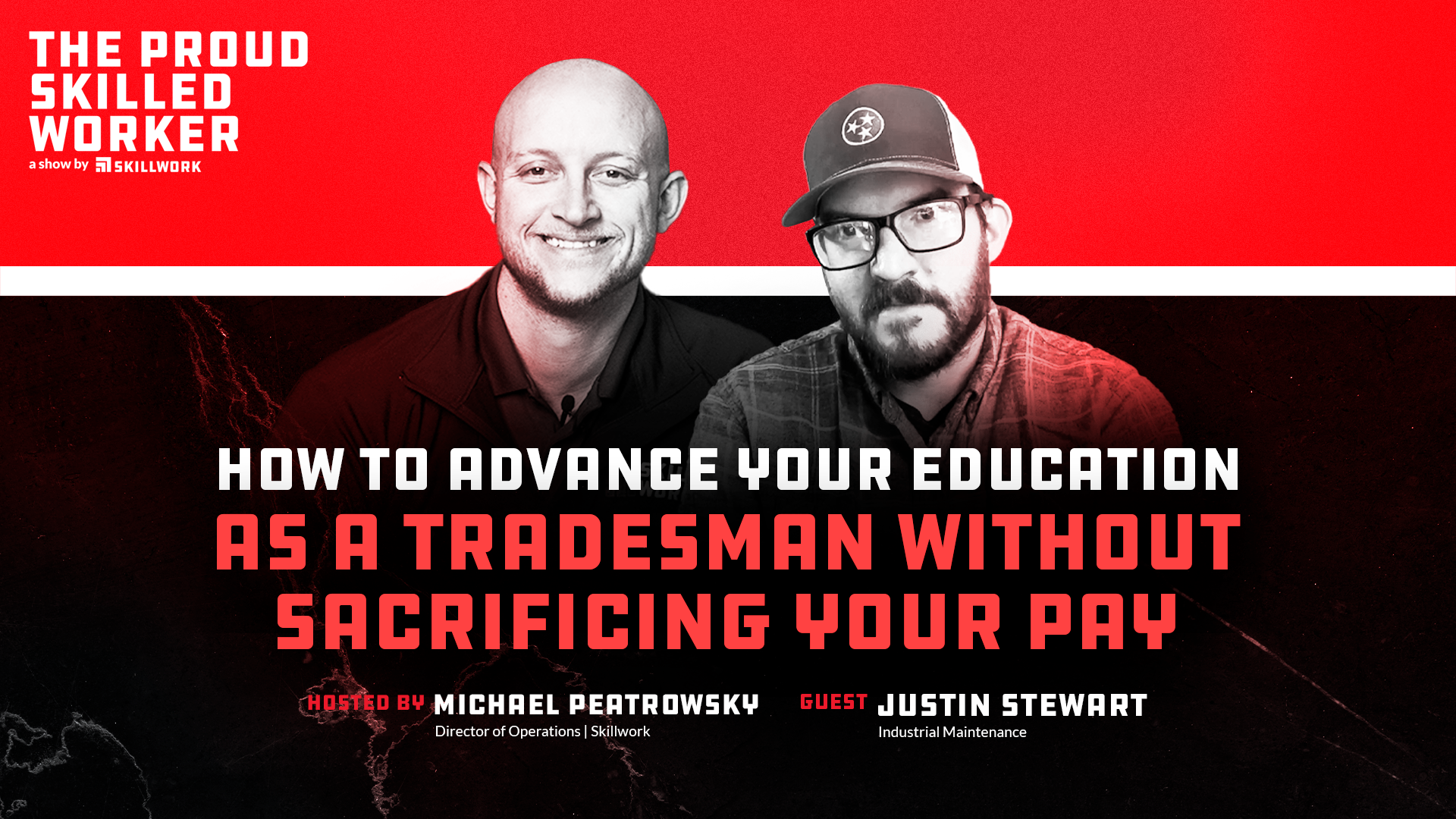
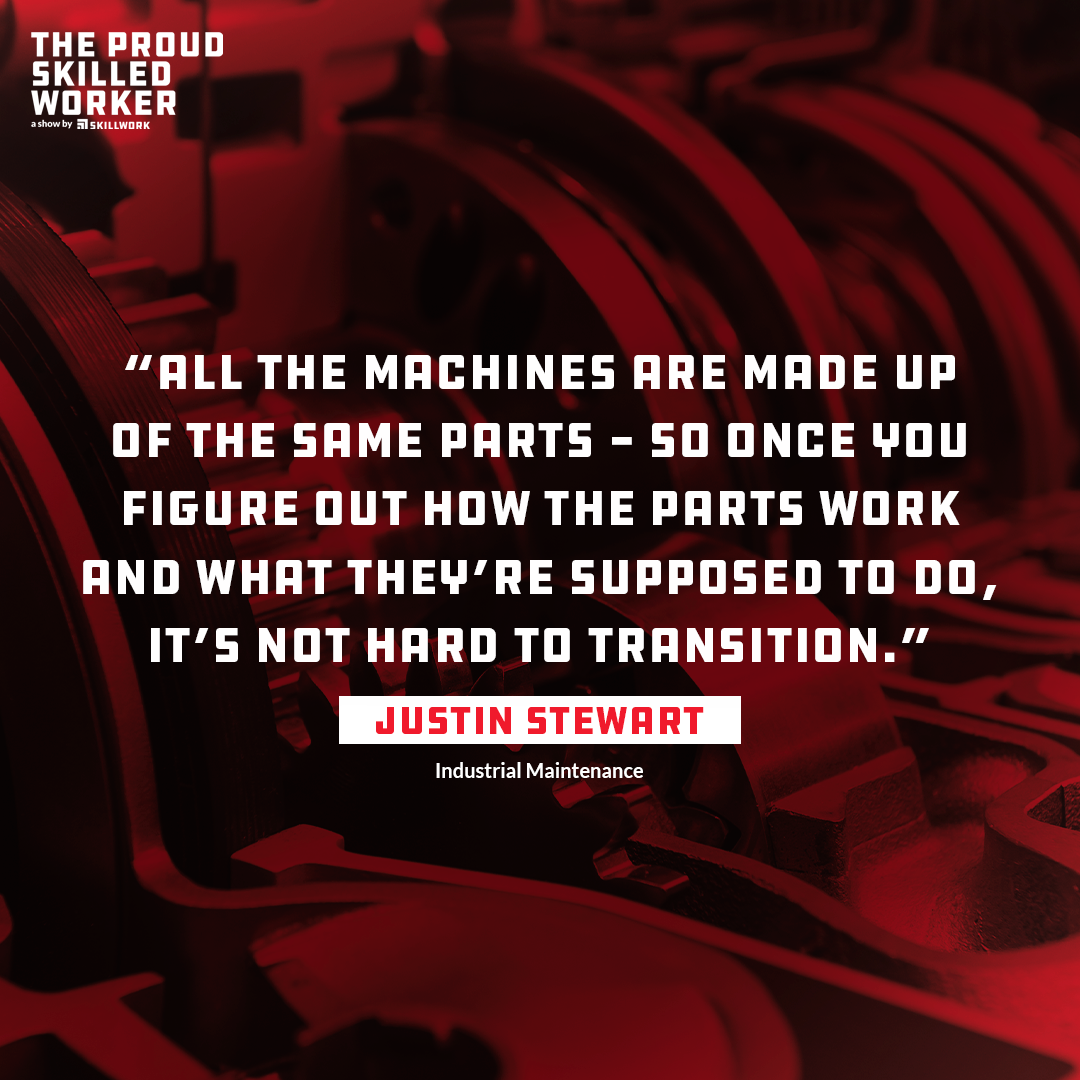
Full Transcription:
Michael Peatrowsky 00:13
Good morning, everybody, and welcome to The Proud Skilled Worker. Today we have Justin Stewart, an industrial maintenance technician who's currently working out of Texas. We're gonna jump right in, and we're going to get to know Justin, we're going to learn about his story, how he got into the skilled trades, the greatest challenges in his career, and then we're going to jump into some questions from the viewers. And so Justin, let's take this thing away, man, tell us, tell us your story. How'd you get into trades?
Justin Stewart 00:36
I'm actually, I'm from South Carolina, and they don't really require a boiler license for boiler operators. It's actually the bottom of the maintenance department there. So I kind of got in the door that way. And then they were like, "oh, you know, you could be doing a lot more than than just sitting back here watching a boiler all night". So they started having me do mechanical stuff, and then slowly worked my way to electrical and through the whole plant.
Michael Peatrowsky 01:03
So transitioning out of the boiler and into the industrial maintenance, like mechanical and actual electrical, what was the biggest challenge that you had getting into, like moving into those roles as you moved up?
Justin Stewart 01:13
The mechanical one wasn't really that bad, because I'd been working in the boiler room. So it's kind of like the same stuff. Similar stuff, pumps and different things that would be out on the production floor. So but electrical was a little bit time consuming, I guess it would be. I didn't really know anything about electrical honestly, I just I lucked out. And the guys who taught me were extremely capable and extremely good teachers. So I was able to learn a lot in a little amount of time.
Michael Peatrowsky 01:46
Right. So as you transitioned into that, and started to kind of move up and and progress your career forward, what was that the biggest challenge you faced? I mean, what did you see as the biggest barrier in Justin's growth?
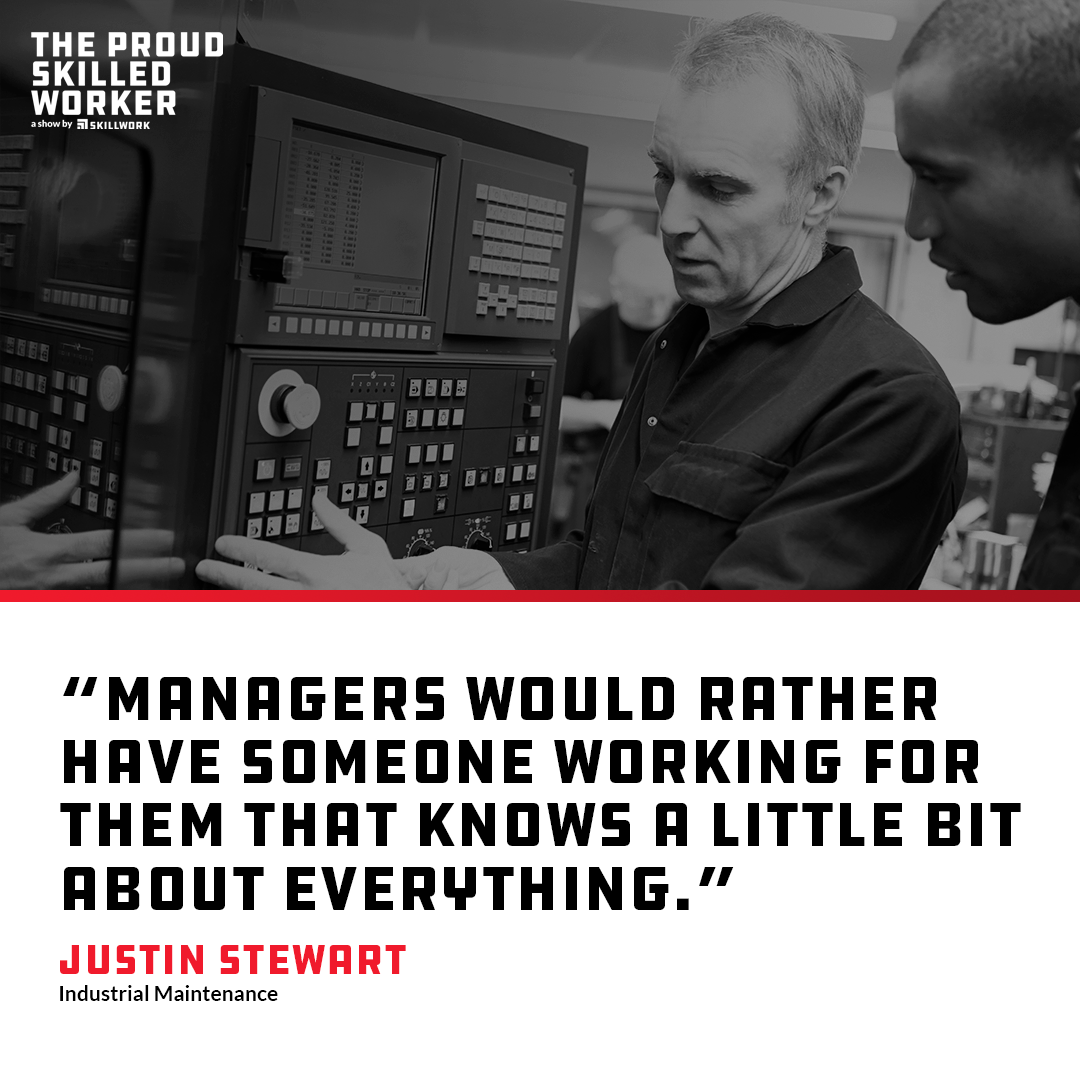
Justin Stewart 02:00
Um, the plant that I was in was not the best. And the biggest barrier was getting my first five years in. Because most places were like, "we want you to have at least five years experience". So I was kind of like stuck, right? Where I was for the first five years, just to get that experience in.
Michael Peatrowsky 02:22
Okay. When you say stuck, I mean, I'm just curious, talk to me a little bit more. Do you feel like you had all the knowledge you needed after three and five years is just what people need paper? Or do you feel like yeah, in those last two, you started to learn a lot of little nuanced things that maybe were you didn't know or understand fully?
Justin Stewart 02:41
I'd say the majority of the learning happened in the first three, like my first year in the boiler room, my first year in mechanical and my first year in electrical, but, um, without having a formal education, I guess you'd say in the field. It was most jobs wanted you to have five years experience in order to get comparable paid, or when I was making without having any kind of schooling.
Michael Peatrowsky 03:10
Great. So great story kind of coming out of South Carolina. Where all have you been, I mean, states wise. Where have you all worked out of, have been located in industries? I mean, what have you, what kind of have you touched as you've grown your career?
Justin Stewart 03:24
Um, honestly, I think Texas is the third place that I've been. I worked a couple of plants while I was in South Carolina, and then one in Tennessee, and then now one here in Texas. Oh, honestly, they were all different. One was a textile plant, one was a chicken processing plant, one was a corrugated paper plant. And now I'm at a taco and shoot plant. So they're all different. But I found a lot of the equipment's similar, like, all machines are made up of the same parts. So once you kind of figure out how the parts work and what they're supposed to be doing, then it's not that hard to transition from plant to plant.
Michael Peatrowsky 04:12
That was my next question is, do you think it's easier or harder to transition industry to industry? Because it sounds like you've been across four with textile and corrugated box and paper and food? I mean, pretty easy, once you know it, wherever you're going?
Justin Stewart 04:26
For the most part, there'll be small differences, but the hardest part really is learning your way around the new facility, because you're like, do I go that way or that way? Or is it all the way in the back or you know what I mean? That's really the time consuming, I guess it takes a couple of weeks to like, get familiar, especially if it's a bigger place.
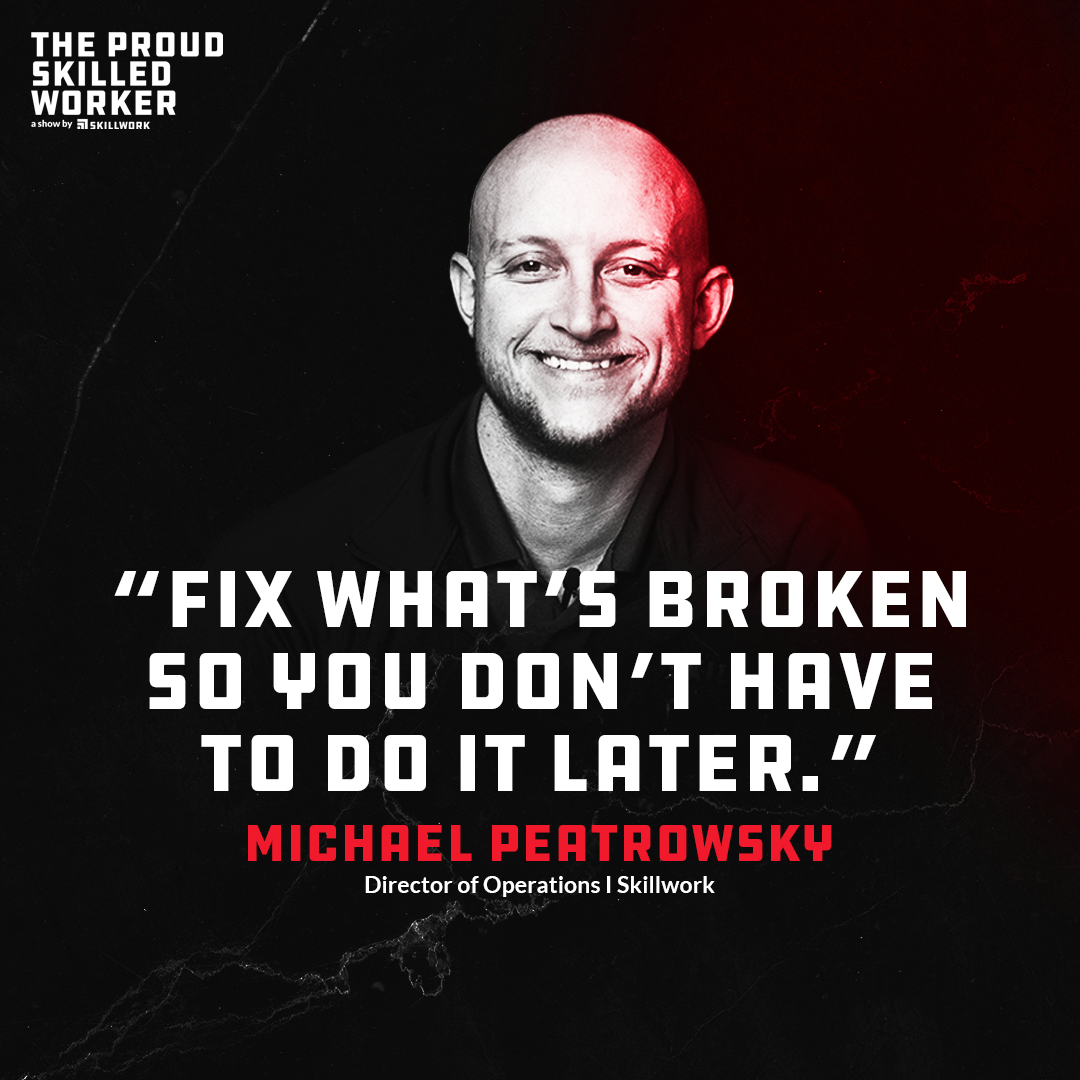
Michael Peatrowsky 04:46
Yeah, some of those places are built like mazes, so. Alright, so next we're gonna jump into three questions that we got from our actual tool bag giveaway, which we just announced the winner for. So congratulations again, Jason Bear for winning that. Kind of first thing we're jumping into here is what is better: to be a jack of all trades or a master of none? And that question comes from Mike M.
Justin Stewart 05:11
I mean, that could be looked at from two sides. I mean, I've done a little bit of everything at this point and it's kind of aggravating, I guess, because jobs expect you to do five jobs instead of just, whereas if I specialized in one thing, then it would be kind of like, I would have this one job. You know? Like, if I specialized in just electrical then anything mechanical, I'd be like, "you know, I don't know anything about that". So it's kind of telling them, whenever you do a little bit of everything, then they expect you to go here and here and here. Or they'll be like, "Oh, this guy can take care of this. I need you to go look at this instead". You know what I mean? So like, you'll get halfway done with a project, and then they won't let you finish it. They're like, "Oh, anybody can do that. We need you to go over here". So it's kind of aggravating in some sense, but the same time, if you'd have your hands on a little bit of everything, it makes it easier to find a job.
Michael Peatrowsky 06:15
Yeah, I was gonna say, I think that part of being a jack of all trades is it's easier for you to land somewhere. But being a master of one almost seems like it's a little easier to climb that ladder. So a little bit of give and take on what it is you're looking for. Are you looking for long term success in a position? Or are you looking to be successful wherever you go? Is that I mean, is that fair? My, is that kind of a fair assessment of that?
Justin Stewart 06:38
That seems like a pretty good assessment.
Michael Peatrowsky 06:40
Okay. What about for you? I mean, you're you said you touch a little bit of everything. If you right now could hit the refresh button, start all over and just pick one thing to jump into, what would you master?
Justin Stewart 06:51
I think I probably would have stayed in the boiler room. Honestly, that's been my favorite job, and you kind of stick by yourself 95% of the time, it's not a bad job. And you know, the other 5% something, something with the boilers messed up, so it's like the whole plants down, like, oh, you gotta hurry up. But um, that's been my favorite, honestly, out of all the positions.
Michael Peatrowsky 07:18
Okay. I think that as somebody who has specialized in jack of all trades like yourself, is it, is there any intrinsic reward or any real value in kind of being "the guy"? Like, "Hey, you're the guy" or, you don't feel?
Justin Stewart 07:34
No, honestly, like I said, it ends up being a headache. If I could get back, I definitely would have just stuck with one thing.
Michael Peatrowsky 07:42
Okay, great. Great. So next thing, and this is going to tie right into that kind of boiler question that you just answered for us. So we got a question here from Josh V. How do I advance my education without sacrificing my paycheck?
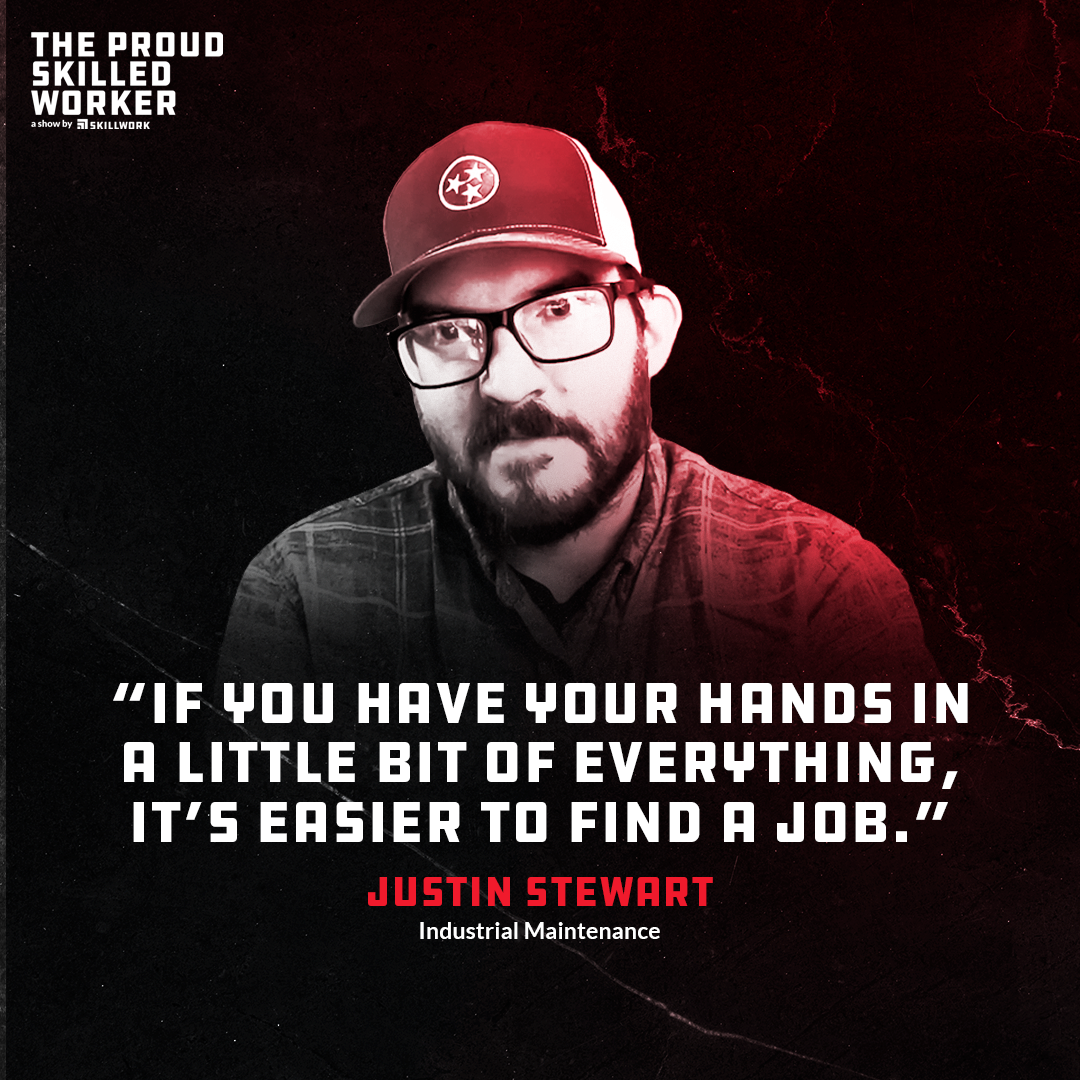
Justin Stewart 07:56
That is honestly, a tough question. I haven't really found a lot of jobs that offer a lot of I mean, Skillwork offers a couple of things. But I haven't really found a lot of jobs that offer you a lot of training, just like basic, whatever is required of the position, but they won't go above and beyond. A bunch of the people that I've worked with recently have been looking online finding different, like online certificates or because they were like it would be better than nothing, like online PLC courses or different things.
Michael Peatrowsky 08:34
Do you do you think it's hard for companies to invest in education and those types of things, because a lot of people want to be Jack of all trades and not masters of one? Or do you think it's because there's a different dynamic going on in the plant floor?
Justin Stewart 08:46
I feel like managers and supervisors would rather have somebody working under them who knows a little bit about everything that way like I said, they can send them here, here, here, here here. I think they would rather have everybody well rounded to an extent because you know, it makes their job easier if they have guys who know the entire plant instead of guys who just specialize in certain areas. Because you know, what, if the guy who specializes in electrical calls out today and he's the only one on shift that knows electrical, you know?
Michael Peatrowsky 09:20
Yeah. I think that you you hit on it a little bit. There's a lot of resources out there now with online classes. I know that Click Safety and we have some certification courses, even through the Garden City Ammonia Program that Skillwork, we actually work with closely. You can get certified in four or five days to be an ammonia operator, which is a skill set that's needed. Click Safety has courses available online. Are those are those things that technicians are looking at? Or are they really wanting to go, "hey, I want to go to an electrical training school because I want to be an electrician or I want to be an electrical maintenane here at this plant". I mean, is is the online option, something that the technicians want to pursue?
Justin Stewart 10:00
I mean, I feel like it is because if it's online, then I can do it at my pace, and it doesn't interfere with my job and home life and whatever else I have going on, you know? I have an hour free today, so I do a little bit of it. Tomorrow I might only have 30 minutes, the next day I might have two hours. So I feel like that definitely makes it a lot more convenient. You know? Our work, anybody who works in maintenance at all knows that the schedule is loosely the schedule.
Michael Peatrowsky 10:36
It's more fluid than it is concrete.
Justin Stewart 10:37
Yeah.
Michael Peatrowsky 10:39
Okay. So definitely awesome to like, think through, like what is actually available for technicians? It's not, doesn't have to be through the facility, even on their own. Finding some stuff that really just helps you kind of level up and grow your own career. If especially if you want to be a master instead of that jack of all trades role that you've kind of talked about. So, definitely great, great ideas there. My the last question we have here is, is why is a person with on the job training overlooked for for someone who has maybe a degree or education? Do you feel like, and that question comes from one of our viewers. Do you feel like people with on the job training are overlooked? Or do you think that they're, they're not overlooked? I'm just curious to know your your thoughts there.
Justin Stewart 11:24
I feel like the first five years they probably are overlooked. Like I said, most places are like, Oh, we're, like I said, from what I found the majority of jobs, they want you to have five years experience as a minimum in order to get like a decent position where you're not like bottom of the pool, you know? But once you get that five years, in my opinion, I don't think it really matters whether or not you have a certificate or not. For as long as you can answer whatever questions they give you. Like, specific, like you interview and they may ask you a couple of mechanical and a couple of electrical and a couple of basic questions. As long as you can answer those questions, then I feel like it doesn't really matter at that point. Or I've seen a lot of jobs who like they want you to have a two year mechatronics degree, or, you know, two years of experience now, I guess, because everybody's having a hard time finding people. So they will take experience in lieu of having the actual certificate or degree.
Michael Peatrowsky 12:32
Are you seeing that more and more on the ground level where companies are starting to kind of compromise on the well, maybe not four years of education, we'll just substitute two years education, two years of technician experience. Are you seeing that more and more?
Justin Stewart 12:44
Yeah, I've noticed that a lot more, or people who have absolutely no experience at all. Or one plant I was in was so desperate for people, they were like, "Oh, this guy's automotive maintenance. So we're going to bring him in because he already knows how to work on stuff at least, he knows how to use tools and stuff." You know?
Michael Peatrowsky 13:03
Do you think that, you think the five years of experience line is companies trying to get a return on their investment? Or what what is your thought? Why five years? I mean, you said you learn most of what you knew in three, you were at a smaller facility with people who were dedicated to kind of growing you in teaching. Do you think five years is is closer to the mark at an average facility to learn all that? Or do you think, like, what's your thought there? I'm curious to know why five.
Justin Stewart 13:28
I think five is more of like, I guess they feel comfortable in that you know what you're doing, and they're willing to give you a decent rate of pay? If that makes sense. Like anything less than that, then they're like, they want to bring you in the door for a lot less pay to see is, "does this guy really know anything? Or is he just"... you know? But I feel like once you get the five years, then they're willing to, "Okay, he must actually in five years", I don't know why it's that specific. But just from my experience with job hunting and everything else, it's always been like "five year minimum". I mean, they they would take people occasionally with less. But um, honestly, I don't even know if that's relevant today. Because everywhere you go, everyone is so desperate for people today that they probably take anyone with a year.
Michael Peatrowsky 14:20
Is that is that frustrating or encouraging to you, like that the bar has kind of moved, given the nature of the industry that you're in, is that a frustration for you? Or do you see that as an advantage of bringing in people, growing them up and kind of building that workforce? What does that how does that feel for you?
Justin Stewart 14:38
Oh, I mean, I feel like it's an opportunity for a lot of people if they're willing to work and take advantage of it. You can get in the door with a lot less than what was required. You know, like, say five years ago, I was having a really hard time trying to find another job. But I mean today, like anyone can go out and you know, find a better opportunity than what they currently have. But, so I feel like it's a good opportunity for somebody who maybe has no experience at all to get into a field where there's a lot more room to grow, than perhaps where they're currently working.
Michael Peatrowsky 15:18
One of the things that I want to ask you, and this isn't from anybody is, you've been to four or five different facilities across three different states. What are three, three principles or kind of three things that you found that doesn't matter where you go, if you do these three things, you'll be just fine in industrial maintenance. I mean, you'll be you'll be okay. And maybe it's not three, maybe it's only two or one or you can just go "well, here's the kind of the recipe or playbook I have of being successful."
Justin Stewart 15:46
I mean, honestly, it's the same things with any job. You show up every day, and you show up on time, and you do whatever they ask you to do and I haven't ever had any problems with work, or, you know, getting fired or anything else. So if you do little things, like, you know, they send you to do this, but you're like, "I also found that this and this, and this was messed up". If you go ahead and take care of those things, instead of just like, "oh, we need to look at all that later, too." I find a lot of jobs are like, oh, you know, like, they feel like you're going above and beyond I guess.
Michael Peatrowsky 16:24
No, absolutely. In those moments where you've gone above and beyond, do you feel like it's recognized or do you think it goes unnoticed?
Justin Stewart 16:33
Both. It's hit or miss. I think for me, it's more of a it bothers me that it's messed up. Because I walk over here 10 times a day and have to look at it. So I want to fix it, if that makes sense.
Michael Peatrowsky 16:46
No, it definitely does is fix what's broken and then you don't have to do it later, I agree. All right, Justin, anything else that you want to kind of speak into the community of so the purpose here of The Proud Skilled Worker is to really give a voice to technicians in the field to give a voice to the craftsmen. And this is an opportunity for you to kind of stand up and say, "Hey, this is what's wrong. This is what we can fix. This is what I see". And really give Skillwork and other opportunities and other companies and even skilled workers like yourself, skilled workers in the field everywhere a chance to really go, "You know what? That is something we can all fix together." Is what's what's something for you, Justin, that if you had a soapbox, that you could stand on and just yell across the room to everybody, "Hey, we got to do we got to do this." What's that thing? I mean, everybody's got one. Everyone's got a thing.
Justin Stewart 17:38
Honestly, and truthfully, my biggest thing right now is every plant that I go in, the overtime, which is nice, because none of us are working all the overtime for free. But at the same time, like, I feel like a lot of places should come up with a way for us to at least get like every other weekend off or something. The last facility I was at, I know, I worked like five, six months straight before I ended up with a Saturday night off. And I'm just like, or a Friday night or anything. Actually, I don't know if I ever got a Friday night off while I was there. It's kind of like, you know, some people have families and diff, I don't have a family or anything. But still, it would be nice to have like, a normal weekend off like everybody else I know does. But you know, especially people who have families and kids and stuff. You know, I feel like maybe the facility should work harder to figure out a way where every other weekend or you know what I mean? Every third weekend, even something. I feel like at least that infuriates a lot of people and ends up driving them to be like, you know, Saturday and Sunday. Probably with us spending every weekend in there, too, I feel like not as much work gets done as what could get done if we were off the previous weekend. Maybe we'd have a little more energy?
Michael Peatrowsky 19:02
Yeah, I definitely think that there should be a way to accommodate the people who want the time off. But I do know, like you said, there's some people who that overtime is is gold to them. So I don't have to adjust all of it, but if there is somebody who says, "Hey, what are your thoughts on maybe me taking Friday?" And so in those cases, do you feel like if you're proactive about it and approach your management, have you had positive results, negative results or kind of just been net neutrals?
Justin Stewart 19:30
Oh, for the most part, it's been fairly, doc for as long as we have enough coverage, then usually if you go to him ahead of time, like "hey, I really need this Friday off because of this". They're semi-accommodating most of the time. It depends on the facility honestly. Some places are like a little more strict by the schedule and everything than others. If nothing else, I found a lot of places like people are willing to swap around schedules with you. So like, if you need Friday off, maybe they have a doctor's appointment Wednesday, so well, I'm off Wednesday, so can we swap? If nothing else, your your fellow workers will usually look out for you if they can, too, so.
Michael Peatrowsky 20:16
Cover down inside the Brotherhood. Perfect. So that's all we have today. I want to thank Justin so much for being on the podcast with us here. Appreciate you guys taking time to watch. Please do subscribe to The Proud Skilled Worker. We're giving a voice to this community. We're doing our best to highlight problems, concerns, and then going after them to solve those things. So continue to subscribe, continue to reach out, ask questions. We'll do our best to answer them on the podcast and I want to just thank Justin so much for his time today on his day off, and then everybody who's watching, appreciate you and reach out. Thank you.
